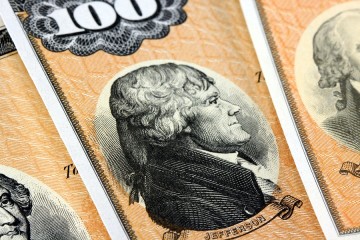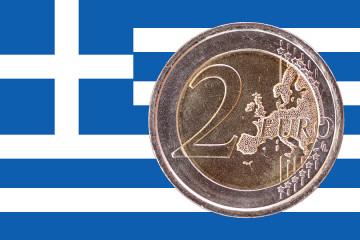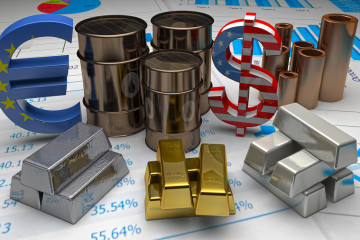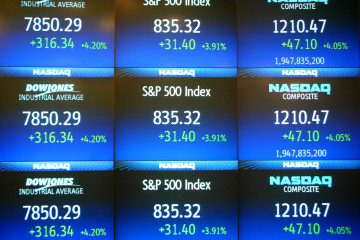U.S. Stocks Halt Quarter Win Streak, Treasuries Fall With Dollar
©2015 Bloomberg News
NQRZ0I6TTDS6
(Bloomberg) — U.S. stocks halted a nine-quarter winning streak and European equities capped the worst three months since 2012 as Greece hurtled toward an uncertain financial future. Treasuries clinched the first quarterly retreat since 2013 with the Federal Reserve poised to raise interest rates this year.
The Standard & Poor’s 500 Index fell 0.2 percent in the three months and is off to its worst start to a year since 2010. The guage added 0.2 percent at 4 p.m. in New York after its biggest drop since April 2014. The Stoxx Europe 600 Index slid 1.3 percent Tuesday to cap a 4 percent slide in the three months. The euro lost 0.8 percent to $1.1146 today, paring its first quarterly advance versus the dollar since early 2014. The yield on 10-year Treasury rose 43 basis points to 2.35 percent since the end of March.
Greece has until 6 p.m. New York time to make a $1.7 billion payment to the International Monetary Fund as a monthslong standoff with creditors entered the 11th hour before its bailout expires. The S&P 500 is up 0.2 percent for the year, after three years of double-digit gains, as the Fed signaled it intends to raise interest rates this year should the economy warrant it.
“Greece of course coming right at the end of the quarter is scrambling everything up,” John Fox, director of research at Fenimore Asset Management in Cobleskill, New York, said by phone. “Our stocks are trading at 100 percent fair value. They’re not really over-valued but they’re not cheap. Fixed income has really struggled.”
Whipsaw Moves
The final day of the period saw intensifying drama in the Greek debt standoff as the nation tried last ditch efforts to receive a financial lifeline. The government asked for a two- year bailout program from the European Stability Mechanism, sought an extension from the IMF and asked the European Central Bank to extend emerging financing. German Chancellor Angela Merkel said there would be no negotiations until after a July 5 Greek referendum.
The S&P 500 opened sharply higher after plunging 2.1 percent on Monday, the most since April 2014. The gauge then erased the gains on signs that Greek creditors wouldn’t entertain new proposals, leaving it up to the government to accept a deal it has deemed untenable.
The S&P 500 fell this week to within 5 points of its average price during the past 200 days before reversing. Stocks have only crossed the level once since 2012 — the period of last October’s selloff, which gave way to an 11 percent advance at the end of 2014.
Quarterly Performance
The U.S. equities benchmark climbed as much as 3 percent during the quarter, setting a fresh all-time high on May 21. Health-care companies added 2.6 percent amid merger activity. The jump in bond rates that sent Treasuries lower boosted financial shares, while utility stocks, long in favor for their dividend yield, plunged 6.6 percent.
Treasuries capped a third monthly slide as a rebound in the world’s biggest economy buoys prospects for the Fed to increase borrowing costs as soon as September.
Data Tuesday showed consumer confidence increased more than forecast in June as Americans grew more optimistic about the economy and the labor market.
Employers added 280,000 jobs in May, the most in five months, and hourly earnings climbed from a year ago by the most since August 2013, a Labor Department report showed on June 5. June payrolls data will be available later this week.
Oil Rebound
Energy shares in the S&P 500 didn’t benefit from crude oil’s best quarterly gain since 2009. The group slumped 2.4 percent, a fourth straight retreat that brings its loss in the past year to 24 percent. West Texas Intermediate jumped 25 percent in the three months, outperforming a 15 percent gain for Brent.
Oil declined in June as the Greek debt crisis prompted investors to avoid risky assets, while signs of a global supply glut persisted. Crude is still lower by more than 40 percent from its June 2014 high.
European assets were whipsawed Tuesday by comments from government officials all over the euro zone, as Greece hurtled toward an uncertain financial future.
The Global X FTSE Greece 20 ETF added 7.7 percent after slumping 19 percent on Monday. American depositary receipts of National Bank of Greece SA added 8.5 percent following a 24 percent plunge.
Greek Crisis
The Stoxx 600 fell a second day after its worst slide of the year on Monday. The gauge dropped 4 percent this quarter, the most since June 2012. Greece’s ASE Index rose 2.8 percent in the period, before its exchange got shut Monday.
The broader gauge rallied 16 percent in the first quarter and hit a record in April, spurred higher by the European Central Bank’s stimulus program.
The advance was stymied by the Greek crisis, a rebound in the euro and a rout in the region’s sovereign debt markets. Germany’s DAX Index plunged 8.5 percent in the quarter, the biggest decline since 2011 and among the worst performances in 24 developed markets.
While Greek turbulence played out in European bond markets, moves reflected investor optimism that contagion would be contained by euro-area and European Central Bank firewalls.
Italy’s government bonds rose Tuesday, halting a two-day decline, and the nation sold 6.8 billion euros ($7.6 billion) of debt.
“If you were looking for serious contagion we would expect auctions to fail or have very meager demand,” said Marius Daheim, a senior rates strategist at SEB AB in Frankfurt.
Europe Debt
Euro-area sovereign securities handed investors a 5.7 percent loss this quarter through June 29, according to Bank of America Merrill Lynch’s Euro Government Index, the worst performance in data going back to 1985.
The euro’s decline pared a 0.6 percent advance from Monday. It’s up 3.9 percent against the dollar this quarter, the most since September 2013.
The euro has thwarted forecasters who saw the currency slumping to $1.06 by the end of June as recently as three months ago. Analysts now see the currency close to that level — at $1.05 — by year-end, the median of more than 60 estimates compiled by Bloomberg show.
The MSCI Emerging Markets Index added 1.3 percent, paring a 3.4 percent monthly drop. The gauge declined 0.3 percent in the quarter, trimming its gain in 2015 to 1.6 percent.
China, Japan
The Shanghai Composite Index index rose for the first time in four days to finish the quarter 14 percent higher, a fifth straight gain. The gauge tumbled from a seven-year high on June 12 into a bear market on Monday. The Hang Seng China Enterprises Index of mainland shares listed in Hong Kong capped a third quarterly advance.
Puerto Rico bonds tumbled for a second day, extending the biggest selloff in at least two decades, after Governor Alejandro Garcia Padilla moved to restructure the junk-rated island’s $72 billion of debt to ease a fiscal crisis.
Japan’s Topix rebounded from its worst drop since January to finish the quarter higher by 5.7 percent.
Platinum fell for a fourth straight quarter in the longest run of losses since March 1997. Prices touched $1,060.20 on June 22, a six-year low.
–With assistance from Sofia Horta e Costa, Paul Dobson, Cecile Vannucci, Neil Denslow and Stephen Kirkland in London, Emma O’Brien in Wellington, Nick Gentle in Hong Kong and Joseph Ciolli in New York.
To contact the reporter on this story: Jeremy Herron in New York at jherron8@bloomberg.net To contact the editors responsible for this story: Stephen Kirkland at skirkland@bloomberg.net Jeremy Herron







No Comment